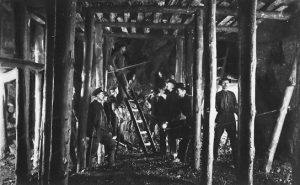 Coal extraction remains an important industry in the Appalachian region, so claims related to coal and other mineral rights make frequent appearances in the eminent domain caselaw of states in the area. A recent example is a Pennsylvania Supreme Court case involving an inverse condemnation claim asserted by two coal companies against the Pennsylvania Department of Transportation. The companies held the mineral rights to a large tract in southwestern Pennsylvania. A portion of the tract had no road frontage, but the companies may have been able to develop private rights-of-way through adjoining tracts that would have allowed mining on that portion of the tract. The coal companies asserted that the paths of these rights-of-way were obstructed when the Pennsylvania DOT took a strip of land through the adjoining parcel for the construction of a highway.
Coal extraction remains an important industry in the Appalachian region, so claims related to coal and other mineral rights make frequent appearances in the eminent domain caselaw of states in the area. A recent example is a Pennsylvania Supreme Court case involving an inverse condemnation claim asserted by two coal companies against the Pennsylvania Department of Transportation. The companies held the mineral rights to a large tract in southwestern Pennsylvania. A portion of the tract had no road frontage, but the companies may have been able to develop private rights-of-way through adjoining tracts that would have allowed mining on that portion of the tract. The coal companies asserted that the paths of these rights-of-way were obstructed when the Pennsylvania DOT took a strip of land through the adjoining parcel for the construction of a highway.
The coal companies therefore filed an inverse condemnation suit. The trial court ultimately ruled in favor of the Pennsylvania DOT, finding that, among other things, the coal companies had not established a reasonable likelihood that they would be able to secure the environmental permits necessary to conduct mining on the parcel at issue. The coal companies appealed, arguing that the likelihood of obtaining a permit is irrelevant to the determination of whether a taking had occurred. Instead, they argued, that factor should only be considered by the commissioners who assigned a value to the taking once it was determined that the government had interfered with the companies’ property rights. The intermediate appellate court agreed with the coal companies and ordered the trial court to reinstate the case. The DOT then appealed to the state supreme court.
The Pennsylvania Supreme Court noted that an inverse condemnation claim requires the landowner to prove that, among other things, a government agency or other condemnor has taken an action that substantially deprives the owner of the beneficial use and enjoyment of property. The coal companies claimed that the isolation of the site meant it was unavailable for use as a coal extraction site. Therefore, the court ruled that, to make out a claim for a taking, the coal companies had to prove that the action of the government deprived them of the use of the property as a coal extraction site. Implicit in this requirement is proof that there was a reasonable likelihood that they could actually use the property in that way. This they had failed to do, as the DOT had introduced testimony from an expert from the state’s environmental regulator that the agency was already concerned with the water quality impact from other mines in the area and was therefore unlikely to issue a permit for additional mining. Accordingly, the court found that the companies had failed to establish that the actions of the government deprived them of the use and enjoyment of their property for coal extraction because they had failed to establish that they had an ability to use the land in that way before the government took action.
While the ruling was undoubtedly bad for the coal companies, the court did offer them a potential silver lining. The coal companies claimed that, if the government’s action fell short of a taking, it still damaged their mineral estate by landlocking it. Because the claim had not been considered by the lower courts, the supreme court remanded this claim to the intermediate appellate court with instructions to remand the case to the trial court for consideration of the companies’ damage claim.
The case serves as a reminder that speculative and contingent claims of future use, whether they be future commercial development or future mineral extraction, are not permitted in eminent domain cases. The opinion, PBS Coals, Inc. v. Commonwealth of Pa., can be found here: : http://www.pacourts.us/assets/opinions/Supreme/out/J-23-2020mo%20-%20104664786125452260.pdf.pdf?cb=2.








Leave A Comment